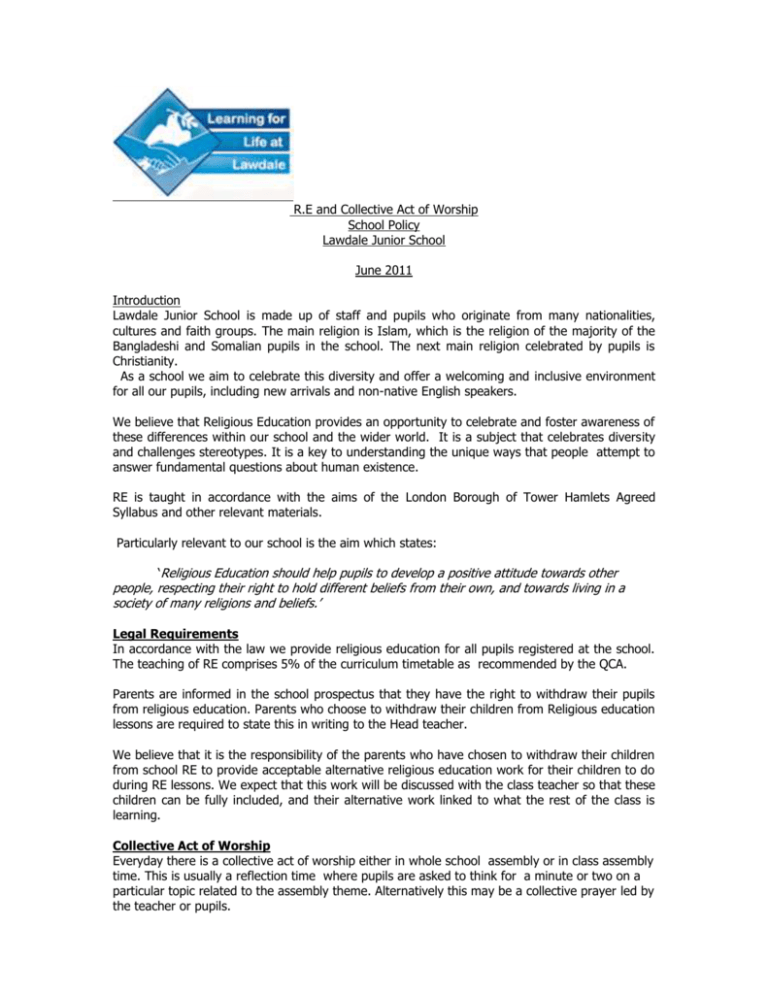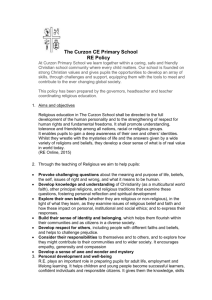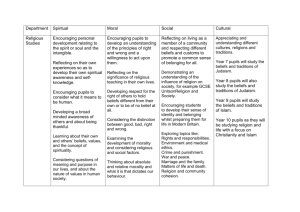Example school policy for religious education
advertisement

R.E and Collective Act of Worship School Policy Lawdale Junior School June 2011 Introduction Lawdale Junior School is made up of staff and pupils who originate from many nationalities, cultures and faith groups. The main religion is Islam, which is the religion of the majority of the Bangladeshi and Somalian pupils in the school. The next main religion celebrated by pupils is Christianity. As a school we aim to celebrate this diversity and offer a welcoming and inclusive environment for all our pupils, including new arrivals and non-native English speakers. We believe that Religious Education provides an opportunity to celebrate and foster awareness of these differences within our school and the wider world. It is a subject that celebrates diversity and challenges stereotypes. It is a key to understanding the unique ways that people attempt to answer fundamental questions about human existence. RE is taught in accordance with the aims of the London Borough of Tower Hamlets Agreed Syllabus and other relevant materials. Particularly relevant to our school is the aim which states: ‘Religious Education should help pupils to develop a positive attitude towards other people, respecting their right to hold different beliefs from their own, and towards living in a society of many religions and beliefs.’ Legal Requirements In accordance with the law we provide religious education for all pupils registered at the school. The teaching of RE comprises 5% of the curriculum timetable as recommended by the QCA. Parents are informed in the school prospectus that they have the right to withdraw their pupils from religious education. Parents who choose to withdraw their children from Religious education lessons are required to state this in writing to the Head teacher. We believe that it is the responsibility of the parents who have chosen to withdraw their children from school RE to provide acceptable alternative religious education work for their children to do during RE lessons. We expect that this work will be discussed with the class teacher so that these children can be fully included, and their alternative work linked to what the rest of the class is learning. Collective Act of Worship Everyday there is a collective act of worship either in whole school assembly or in class assembly time. This is usually a reflection time where pupils are asked to think for a minute or two on a particular topic related to the assembly theme. Alternatively this may be a collective prayer led by the teacher or pupils. The Scheme of Work The scheme of work for Religious Education covers all the requirements of the Agreed Syllabus. RE is taught in topic units in a combination of religion-based and thematic topics. Year 3: Topics covered: Sikhism, Divali, Jesus, the importance of faith, the Bible and signs and symbols Skills: listening, discussing, and recognising similarities and differences between religious beliefs and stories, empathy with others beliefs, reflecting on our beliefs. Year 4: Topics: Hinduism, Christmas Journeys, Special Books, Easter, Skills: listening, discussing, recognising similarities and differences between religious beliefs and stories, empathy with others beliefs, reflecting on our beliefs. Year 5 Topics :, Term 1: Why is Mohammed important to Muslims? How do Muslims express their beliefs through the five pillars of Islam? Term 2: Where did the Christians bible come from? How do the beliefs of Christians influence their actions? Term 3: Sikh beliefs and practice and special people Skills acquired: An understanding and appreciation of different beliefs. Year 6 Term 1 Worship and community What can we learn from Christian religious buildings? Term 2 Why are sacred texts important? Expressing faith through the arts Term 3 Role of the Mosque The Qur'an The RE topics cover the main religions worshipped in the school and other main religions such as Buddhism. The core focus is Christianity and Islam with the majority of time being devoted to these topics. Teaching and Learning Planning for Religious Education is based on the two Attainment Targets in the Agreed Syllabus: 1. Learning about Religions 2. Learning from Religions Learning about religion includes enquiry into and investigation of the nature of religion, its key beliefs and teachings, practices, their impacts on the lives of believers and communities, and the varying ways in which these are expressed. It also includes the skills of interpretation, analysis and explanation. Pupils learn to communicate their knowledge and understanding using specialist vocabulary. It also includes identifying and developing an understanding of ultimate questions and ethical issues. Learning from religion is concerned with developing pupils’ reflection on and response to their own experiences and their learning about religion. It develops pupils’ skills of application, interpretation and evaluation of what they learn about religion, particularly to questions of identity and belonging, meaning, purpose and truth and values and commitments, and communicating their responses. Inclusion and differentiation for children with SEN and EAL are taken into account in our planning and teaching as they are in all areas of the curriculum. Within the teaching of RE we make the most of opportunities to help the children develop their sensitivity to relevant issues such as refugees and religious fasting, and to develop positive attitudes towards themselves and others. We endeavour to draw on the varied experiences and backgrounds of our pupils and staff in order to make RE relevant and interesting to our pupils. One way of doing this is through our links with local religious communities and places of worship. We try to ensure that children have at least one local RE visit every year. Through RE children have the opportunity to develop many key skills such as thinking, researching, evaluating, reflecting and empathising. Wherever possible, links are made between Religious Education and other curriculum subjects. We also look at belief systems in the Ancient World eg Ancient Greece Spiritual, Moral, Social and Cultural Development Religious Education is a key opportunity for children to develop morally, spiritually, socially and culturally. In RE lessons, as well as PHSE and our Collective Worship programme, children are invited to reflect on their personal responses to issues, consider other people’s responses, and appreciate that for some people belief in a spiritual dimension is important. We encourage children to consider the answers offered by faith groups to questions of meaning and purpose and problems within society and their own experience. Religious education also strongly supports the school’s citizenship programme by introducing pupils to the significance of belonging to a community, the diversity of communities in the wider communities, faith rules and their application to moral and ethical issues and cultural influences on religious practice. Recording, Marking, Assessment and Reporting Pupil’s work is marked according to the school’s marking and assessment policy. Assessments are made at the end of each topic to assess if children are working at expected levels or above or below these levels. Management The teaching, assessing and resourcing of Religious Education is managed by the SMT. Assessments at the end of each half-term are collected by the assessment co-ordinator. At the end of each year parents will receive an annual report stating whether the child is achieving at expected levels for their age. Teachers will attend training and professional development, and organise INSET and training for other members of staff when necessary. RE planning is collected for monitoring twice a year every, and the scheme of work is evaluated annually by the SMT. Pupil and teacher resources are bought through the library budget and should be ordered by year group leaders through the librarian. The storing of the school’s RE resources is organised by the librarians. Agreed by staff………………………………………… Agreed by Governors…………………………………..






![afl_mat[1]](http://s2.studylib.net/store/data/005387843_1-8371eaaba182de7da429cb4369cd28fc-300x300.png)

